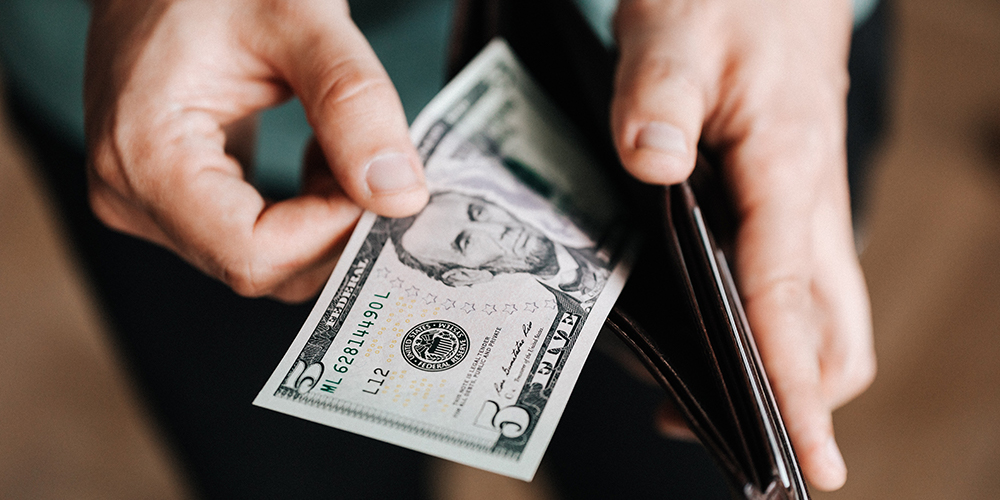Regardless of whether you’ve lost your job or kept it during the pandemic, you have undoubtedly been affected financially in some way over the past 8 months. For those who have been furloughed or laid off, it’s more obvious. If you’ve kept your job, you might be operating in a limited capacity, experiencing setbacks, or have a decreased client base. Of course, some of us are luckier than others, but if you’re not Jeff Bezos or Elon Musk (who have seemed to profit endlessly during COVID), chances are your bank statement looks a little different than you thought it would.
So how do these changes affect how we’re spending this year? Here are 7 ways Americans have changed their spending habits since March.
Out of work, using up savings
For those who are out of work and require more to live on than the negligible unemployment amount (especially after the extra $600 in COVID relief expired), resorting to savings is a means of survival. I’m sure no one imagined the “rainy day” they were saving for would be the economic repercussions of a global pandemic, but here we are.
Slashing expenses, saving more
We all arguably have less to spend money on these days. Going out to eat and drink? Travel? Shows and events? Not so much. It’s possible our wallets might be feeling a bit flush (especially if you’re still employed). As a result, many Americans are putting this new extra cash into their savings. Re-fluffing your financial cushions is a smart move, no doubt about it.
Putting life on hold
Did you want to move to New York City last spring before all hell broke loose? Did you want to buy a house or go back to school? You’re not alone. With all the financial insecurity that COVID-19 has brought on, it’s no wonder why many Americans are putting their dreams on hold.
Paying off debts
Similar to stock-piling cash for saving, many Americans are taking this time to pay off debts they have, weather that be a mortgage, students loans or something else. Smart move, I must say.
Looking to buy a home
Have you saved so much during the pandemic that you actually have enough to make a down payment on a house? Good for you!
It’s also important to note here that this trend also applies to those who participated in the mass flights from major cities to the ‘burbs – why live in a tiny, cramped apartment during a pandemic when you could buy a spacious home 30 miles away?
‘Comfort shopping’
Ain’t nothing wrong with a little retail therapy. If you’re using your end-of-the-month surplus on fun items for you, your home or others, I totally get it. Chase that serotonin rush – times are hard out here!
All that aside, as a consumer, I find market trends and marketing techniques during COVID so interesting. Absolutely no shade if you end up buying that $80 face cream because #selfcare (I’ve been there), but I have a fun time dissecting the ways in which digital marketers are extorting the current moment for financial gain. Think about it the next time you’re about to buy something you 100% would not have in a pandemic-less world.
Donating more than ever
On the other side of the spectrum, many Americans who have a little extra to spend right now are helping out their communities and other funds by donating to them. Whether it be mutual aid funds that provide meals to members of the community who need it right now, or to national funds that support disenfranchised or marginalized groups hit hardest by the pandemic, Americans are donating more than ever – especially with their stimulus checks!
It’s always interesting to see how large-scale events impact micro-economies, such as individual American households. The discrepancy between those who are working and those who are not plays a crucial role in dissecting spending habits but have less to do with the overall picture than one might think.
It will be interesting to see if COVID-induced spending habits will just be a fad for these dire times, or if they will continue after a vaccine is widely distributed. It seems only time will tell.
Anaïs DerSimonian is a writer, filmmaker, and educator interested in media, culture and the arts. She is Clark University Alumni with a degree in Culture Studies and Screen Studies. She has produced various documentary and narrative projects, including a profile on an NGO in Yerevan, Armenia that provides micro-loans to cottage industries and entrepreneurs based in rural regions to help create jobs, self-sufficiency, and to stimulate the post-Soviet economy. She is currently based in Boston. Besides filmmaking, Anaïs enjoys reading good fiction and watching sketch and stand-up comedy.














































Pingback: The new Chipotle location will be fully digital - The American Genius
Pingback: U.S retail sales slow to bounce back prior to COVID winter
Pingback: Surprise: Savings have mostly grown during the pandemic